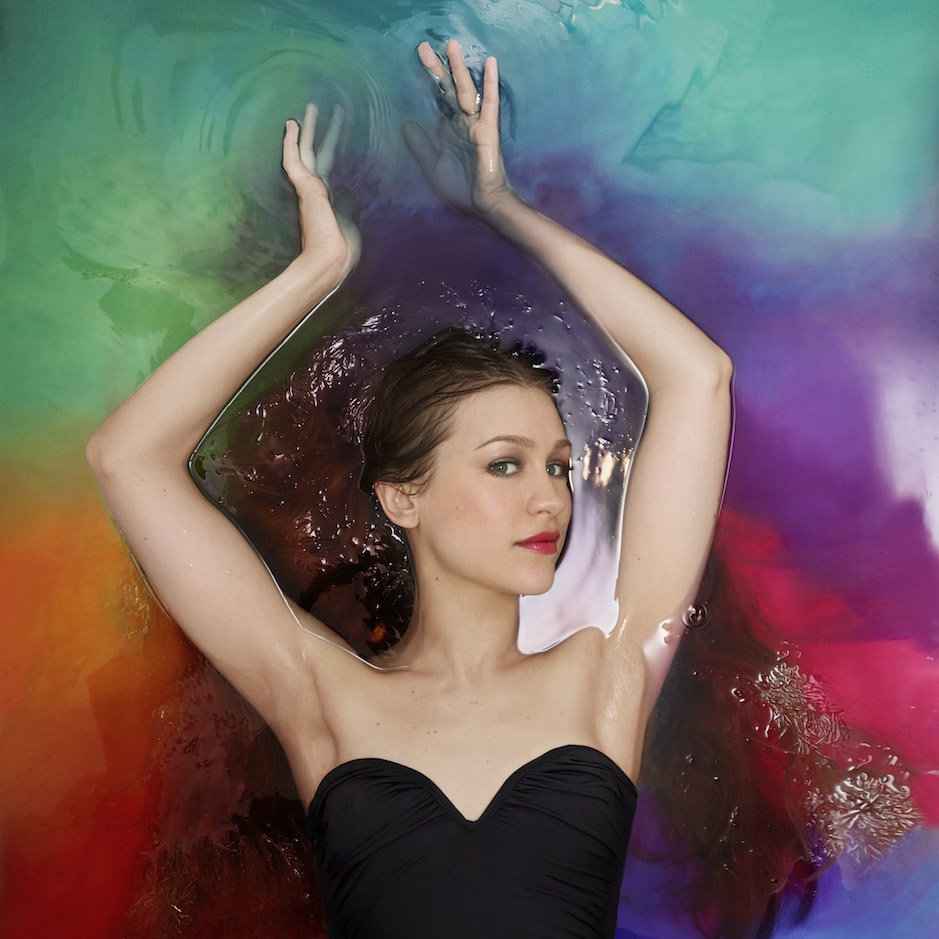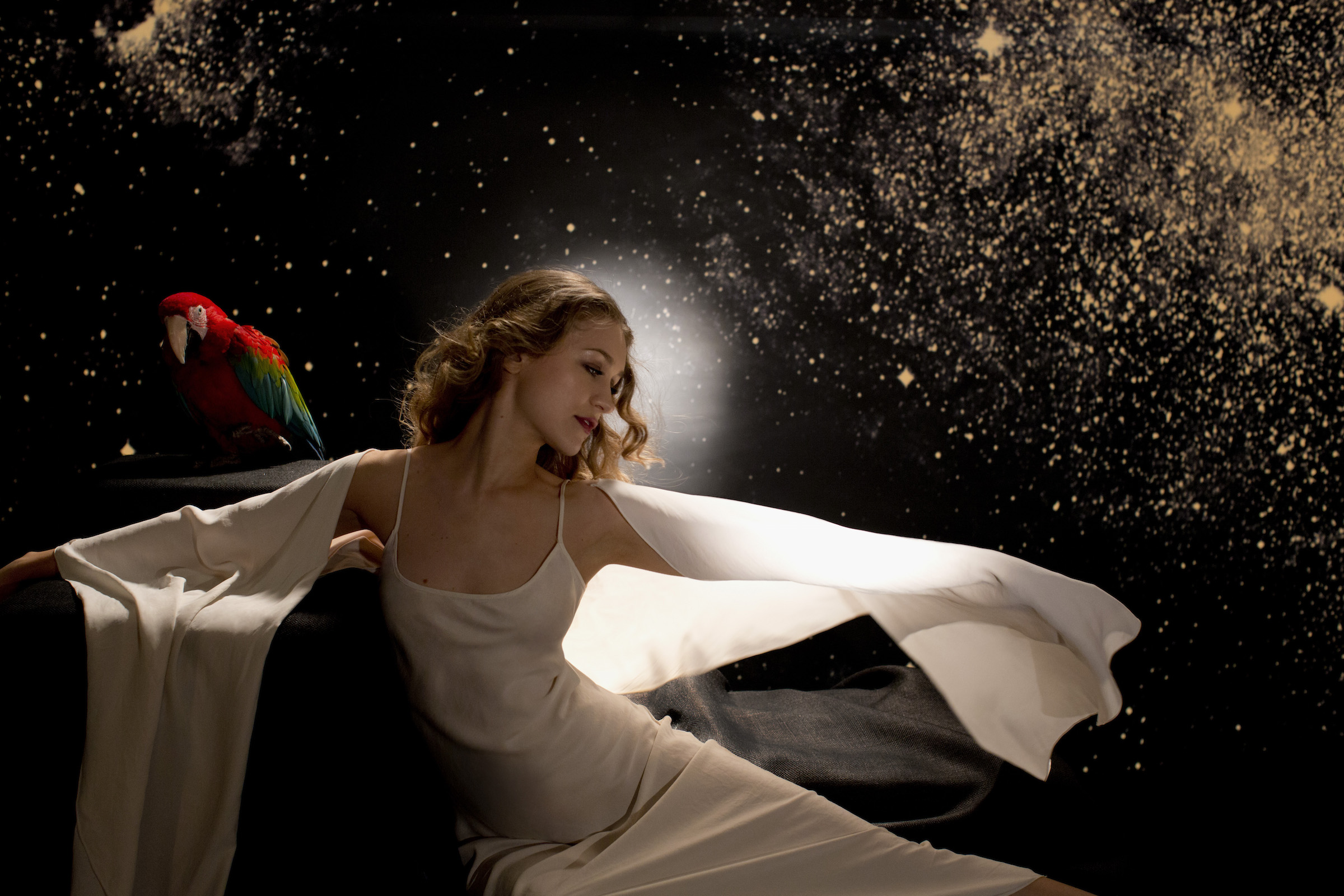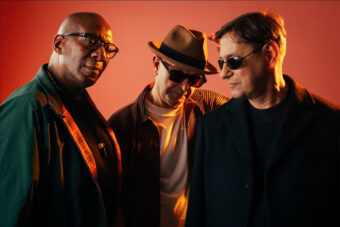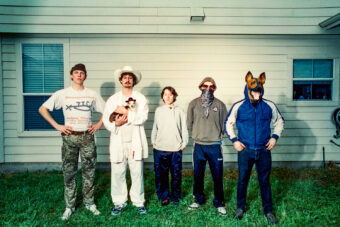Speaking over the phone from Los Angeles, Joanna Newsom apologizes for rambling. What she doesn’t realize is that what qualifies as “rambling” for the 33-year-old harpist, singer, and writer of velvet-bound lyrical prose would, for anyone else, be described as “speaking in fully thought-out paragraphs.” Even a transcript of her interview with SPIN yields exactly zero ums or ahs — the only time she stumbles is to say “emotionally complicated” instead of “melodically complicated” when referring to the harp, her signature instrument that she first voiced a desire to play at age four. A question about the possibility of a Freudian slip is politely laughed over as she corrects herself.
Divers, Newsom’s recently released fourth album, is as meticulously architected as her sentences, and the most graceful, ornate emblem of a decade-plus career. Her full-length debut, 2004’s The Milk-Eyed Mender, introduced her Lyon & Healy’s gilded Medieval peals and her singular timbre, as rich and sour as curdled cream as it swoops across octaves and spectrums. Since that LP’s release, Newsom has divided listeners as easily as she cops to hating bananas. Critical awe and bewilderment accompanied her 2006 sophomore effort, the densely, delicately wrought five-track epic dubbed Ys (both of which reportedly sold at least 200,000 copies), which was followed by the three-disc, two-hour Have One on Me in 2010. That record — which hit shelves and iTunes libraries a little more than a year before Visions of Joanna Newsom, a Bob Dylan-referencing book of essays by writers and admirers such as Dave Eggers — remains a sumptuous and expansive tapestry of her cross-genre talent.
Newsom’s sheer ambition saw her critical standing swell and, eventually, writers would — for the most part — retire the all too-common charge that her singing style was “childlike” or that of a “woodland sprite.” Of course, it helped that her voice has matured over the years as well; Newsom has rounded the piercing squeaks and ear-bending lows on such songs as Ys‘ “Cosmia” into something closer to a knotty purr. But even with the lilting cascades of her harp, Newsom’s music is an acquired taste. Divers, though, like all of her work, rewards with a rare feeling of intimacy, as if she’s singing just for you (which she recently guessed might be the reason she has some fans that are a little too devoted).
Her lyrics, too, outline fantastical yet finely wrought stories from a singular imagination. An exemplary verse, from Divers opener “Anecdotes”: “But, inasmuch as that light is loaned / And, insofar as we’ve borrowed bones / Must every debt now be repaid / In star-spotted, sickle-winged night raids.” Such poetry is worth revisiting almost obsessively, as much as Newsom herself returns to texts by Nabokov and Camus.
“I have a really awesome audience of people who pay really close attention to the lyrical details of my music,” Newsom says. “That’s definitely enough for me.” Below, the singer-songwriter opens up to SPIN about her creative process, the influences she draws from, and how her technique has deepened over the years.
You’ve been playing the harp for at least 25 years now — most artists who start playing an instrument at that young of an age move on to a new instrument or change their interests. What new things have you found to love about the harp? And have you ever thought about focusing on another instrument?
I mean, in the last seven or eight years — starting with Have One On Me and extending into the process of making Divers — I got excited about improving my piano playing and using it as more than just a textural element. I felt like my ability of playing piano was limited to either rhythmic enunciation — big, blocky chords — or little decorative figures that weren’t really central to the song or to an instrumental palette. I think I really started focusing on — not mastering, because I’m nowhere near a master of the piano — becoming proficient enough with the piano, in the last couple of years. Enough so I could lean on it as the main instrument in a song, and do things on the piano that replicate what I can do on the harp. Part of that was because it was fun to do something new. I was hoping to expand my abilities.
I was pretty fickle and flake-y as a kid. I would constantly change what I wanted to do or what I wanted to be when I grew up. I would take, like, three gymnastics lessons, then I would want to buy a horse, and luckily my parents didn’t let me buy a horse. That was constantly changing all the time, but the one thing that never changed, ever, was that I loved to play the harp, and that I’d play the harp every day. It’s more of a constant continuum, where it’s an instrument you can sit down in front of and return to every single day, ask questions of, and it will help answer those questions instrumentally. There’s a lifetime’s worth of studying you can dedicate to that instrument if you want to.
Do you feel the same way about the extra-musical sources that you find inspiration from? You seem to have this never-ending well of characters that reappear. Are there any texts by authors that you revisit and reinterpret for each album?
That’s a good question! Not in a conscious way. Overall, with books or albums, I am very much a creature of habit. I will return to the same books over and over again, even if it’s not in the context of preparing for a new record or trying to find inspiration for a new record. I do still find myself on these ten-year cycles with books where I’m like, “Now it’s time to reread The Sound and the Fury.” With albums, I’m almost neurotically attached to a somewhat small collection of albums pretty much all made between 1971 and 1979.
Which ones?
Some of them include First Light by Richard and Linda Thompson, Randy Newman by Randy Newman, Roy Harper’s Storm Cock, Joni Mitchell’s Blue; Mickey Newbury’s Looks Like Rain is a huge one for me. I have a lot of records, I just always tend to reach for the same ones in my record collection.
It seems like your most devoted fans, “the delvers,” find similar layers of investment in your own work. And the way you tell stories remains timeless even as technology seems to move faster and faster, even when comparing 2015 to 2010. Are you ever concerned about how technology will impact how your music is made or interpreted?
I used to be really worried about the disappearance of physical media, because I’m an acolyte of analog recording, and the vinyl record is a very important aspect of my music. The vinyl record will be the version of the album that has gone through the fewest digital generations as possible. I record all my basic tracks on tape, then I do an analog mastering process, so by the time it exists in vinyl form, it’s the purest sonic expression of the album. I was getting worried that the market would become so small that it would stop being economically viable for printing plants to stay in business. I’m still pretty worried about the actual tape — that disappearing is still a major concern of mine.
Do you wake up in the morning fearful?
[Laughs.] Quality tape is diminishing! It’s harder and harder to get, which is kind of scary. It’s funny because often these albums have been totally recorded on ProTools — everything digital — and the last phase is pressing a vinyl record; but I’m still glad there is a resurgence, because it is allowing for the preservation of analog recording and media. I just like holding objects. I like holding the record in my hand, superior sound aside; although I definitely do think analog sounds better than digital. I love the ritual of putting on a record, listening to it, putting it back in its sleeve, and choosing another one. I feel like the digitization of everything is an expression of how short everyone’s attention spans are, and how much information and content people constantly need — a stream of music never stopping. It becomes an unconscious thing, which isn’t my preferred way of experiencing music.
I discovered a thread online of people desperately searching for the split seven-inch that you released with the Black Keys, but it seems something like that might be lost in some dusty bin somewhere because it doesn’t exist digitally.
That is really funny that it’s phrased as “a split seven-inch I did with the Black Keys” because it was just a little seven-inch we did for our friend’s wedding — that’s probably why it’s so rare! [Laughs.] He must have made only 100 or 200 of those.
I bet they’re selling for a good chunk of money on eBay right now. You do have a lot of those little gems in your discography, like the Joanna Newsom and the Ys Street Band EP. Do you ever wish that you got more of an opportunity to talk about them, or do you ever revisit them?
I feel like I do revisit them sometimes, but I definitely want to bring the song “Colleen” from that EP back in the live set. It’s pretty hard to play, and I haven’t practiced it in a while.
Why is it hard to play?
There is a lot of footwork in that song, there is a lot of pedaling and key changing. It’s just really fast. It’s funny, a lot of the stuff that sounds easy on the harp is harder, and some of the stuff that sounds harder on the harp is actually easier. A lot of the very precise, quick, irregular melodic runs are harder, where there’s no repetition. Harp people can get really fast with repetitive, arpeggiated things; where your fingers are flying but they’re doing the exact same thing over and over. You get these shapes in your muscle memory where you’re rushing up and down the strings, always on the same notes.
Speaking of complicated musical technique: Earlier this year, Grimes and, even more notably, Björk spoke out about the issue of women not getting proper credit for their work, particularly when a male producer is involved in the project. It reminded me of the press around your early work, when a lot of male critics said your voice has a “childlike quality,” belying the complex musicianship behind it. Has that changed for you this year especially and how has it changed over the course of your career?
I’d say… I don’t know if this year particularly has marked a hard shift for me, but I definitely think over the last 11 or 12 years there has been a shift where people have stopped thinking of me as a beneficiary of standing in close proximity to smart producers and happening to play a pretty instrument and sing fairy-tale songs. That definitely shifted quite a while ago.
I love how much attention Björk is finally getting as a producer, because she’s so monumentally talented in that department and has been for years and years. It’s really interesting when she’s written about how often you hear any compliment about the production on her record mentioning someone else in the same sentence. A lot of her accomplishments have been somewhat diminished about the way they’re described in proximity with the contributions of male collaborators. I’m super excited that Grimes is getting so much attention for her amazing production too because she’s super, super talented. And she does everything! She produces completely on her own.
I don’t turn knobs myself, I produced this record and [Have One On Me] with… I can’t even remember if I officially co-produced it or not. I worked really closely on this record and that record with Noah Georgeson, who basically put up with my insane mixing demands for six months straight. It was such an immersive process, and he was so awesome throughout that whole thing. This was the first record I actually co-mixed instead of letting the engineer do everything. This is the first record where I’ve had strong opinions about every technical element on the whole album, about where every instrument should sit and what every instrument should sound like. I always felt that way about arranging, I’ve always been a hyper micro-manager when it comes to every musical note on an album. In the past I was weirdly intimidated by the mixing phase. At this point in my career it’s kind of all the same thing.





